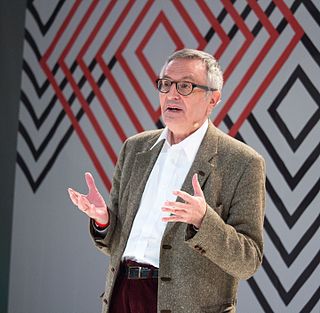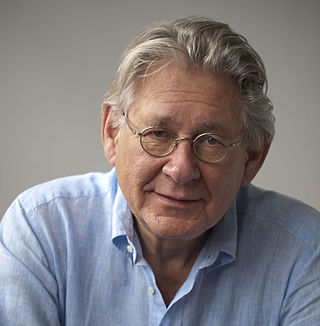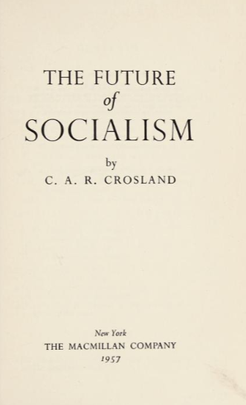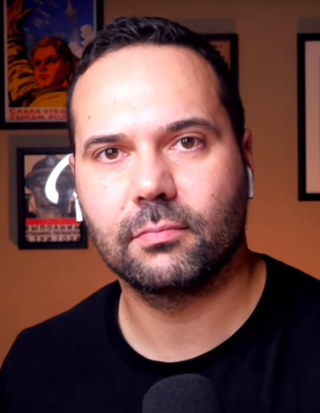
John Nicholas Gray is an English political philosopher and author with interests in analytic philosophy, the history of ideas, and philosophical pessimism. He retired in 2008 as School Professor of European Thought at the London School of Economics and Political Science. Gray contributes regularly to The Guardian, UnHerd, The Times Literary Supplement and the New Statesman, where he is the lead book reviewer. He is an atheist.

Leo Victor Panitch was a Canadian research professor of political science and a Canada Research Chair in comparative political economy at York University. From 1985 until the 2021 edition, he served as co-editor of the Socialist Register, which describes itself as "an annual survey of movements and ideas from the standpoint of the independent new left". Panitch himself saw the Register as playing a major role in developing Marxism's conceptual framework for advancing a democratic, co-operative and egalitarian socialist alternative to capitalist competition, exploitation, and insecurity.

Nancy Fraser is an American philosopher, critical theorist, feminist, and the Henry A. and Louise Loeb Professor of Political and Social Science and professor of philosophy at The New School in New York City. Widely known for her critique of identity politics and her philosophical work on the concept of justice, Fraser is also a staunch critic of contemporary liberal feminism and its abandonment of social justice issues. Fraser holds honorary doctoral degrees from four universities in three countries, and won the 2010 Alfred Schutz Prize in Social Philosophy from the American Philosophical Association. She was President of the American Philosophical Association Eastern Division for the 2017–2018 term.
Post-capitalism is in part a hypothetical state in which the economic systems of the world can no longer be described as forms of capitalism. Various individuals and political ideologies have speculated on what would define such a world. According to classical Marxist and social evolutionary theories, post-capitalist societies may come about as a result of spontaneous evolution as capitalism becomes obsolete. Others propose models to intentionally replace capitalism, most notably socialism, communism, anarchism, nationalism and degrowth.

Gérard Horst, more commonly known by his pen names André Gorz and Michel Bosquet, was an Austrian and French social philosopher and journalist and critic of work. He co-founded Le Nouvel Observateur weekly in 1964. A supporter of Jean-Paul Sartre's existentialist version of Marxism after the Second World War, he became in the aftermath of the May '68 student riots more concerned with political ecology.

Criticism of capitalism typically ranges from expressing disagreement with particular aspects or outcomes of capitalism to rejecting the principles of the capitalist system in its entirety. Criticism comes from various political and philosophical approaches, including anarchist, socialist, Marxist, religious, and nationalist viewpoints. Some believe that capitalism can only be overcome through revolution while others believe that structural change can come slowly through political reforms. Some critics believe there are merits in capitalism and wish to balance it with some form of social control, typically through government regulation.

Sam Gindin is a Canadian intellectual and activist known for his expertise on the labour movement and the economics of the automobile industry.

Wendy L. Brown is an American political theorist. She is the UPS Foundation Professor in the School of Social Science at the Institute for Advanced Study in Princeton, NJ. Previously, she was Class of 1936 First Professor of Political Science and a core faculty member in The Program for Critical Theory at the University of California, Berkeley.

The Future of Socialism is a 1956 book by Anthony Crosland. It was one of the most influential books in post-war British Labour Party thinking. It was the seminal work of the 'revisionist' school of Labour politics.

Blue Labour is a British campaign group and political faction that seeks to promote blue-collar and culturally conservative values within the British Labour Party – particularly on immigration, crime, and community spirit – while remaining committed to labour rights and left-wing economic policies. It seeks to represent a traditional working-class approach to Labour politics.

Franco "Bifo" Berardi is an Italian Marxist philosopher, theorist and activist in the autonomist tradition, whose work mainly focuses on the role of the media and information technology within post-industrial capitalism. Berardi has written over two dozen published books, as well as a number of essays and speeches.

Wolfgang Streeck is a German economic sociologist and emeritus director of the Max Planck Institute for the Study of Societies in Cologne.

Blue Labour: Forging a New Politics is a 2015 book edited by Maurice Glasman, Baron Glasman, and Adrian Pabst. The collection of chapters by different contributors attempts to further articulate the Blue Labour political tendency within the Labour Party and British politics more generally, building on previous books such as The Labour Tradition and the Politics of Paradox: The Oxford London Seminars, 2010–2011 and Tangled Up in Blue. In his foreword, Rowan Williams states that whilst contemporary academic thought is increasingly questioning the idea of a "solitary, speechless individual" with utilitarian aims as a theoretical starting-point, this has not been accompanied by an associated shift in public rhetoric and popular imagination. He expresses his belief that if people are to change politics in a positive manner, especially in light of the recent financial crisis, we must develop new communitarian approaches that start from civil society upwards. The remainder of the book is accordingly a development of this basic notion, arranged thematically.

PostCapitalism: A Guide to Our Future is a 2015 book by British journalist and writer Paul Mason.

Nick Srnicek is a Canadian writer and academic. He is currently a lecturer in Digital Economy in the Department of Digital Humanities, King's College London. Srnicek is associated with the political theory of accelerationism and a post-scarcity economy.

Capitalist Realism: Is There No Alternative? is a 2009 book by British philosopher Mark Fisher. It explores Fisher's concept of "capitalist realism", which he describes as "the widespread sense that not only is capitalism the only viable political and economic system, but also that it is now impossible even to imagine a coherent alternative to it."

Grace Blakeley is an English economics and politics commentator, columnist, journalist and author. She is a staff writer for Tribune and panelist on TalkTV. She was previously the economics commentator of the New Statesman and has contributed to Novara Media.

Masters of the Universe: Hayek, Friedman, and the Birth of Neoliberal Politics is a 2012 book by barrister Daniel Stedman Jones, in which the author traces the intellectual development and political rise of neoliberalism in the United States and the United Kingdom. Originally a PhD thesis, the author adapted it into a book.

Economics for the Many is a 2018 collection of essays edited by the British Labour politician John McDonnell. The book contains left-wing perspectives on topics such as industry, housing, tax and devolution. It was published by Verso Books.

Aaron John Bastani is a British-Iranian political commentator, journalist and author. He co-founded the left-wing media organisation Novara Media in 2011 and regularly hosts and contributes to its Novara Live live news show on YouTube. Bastani popularised the term "Fully Automated Luxury Communism", which describes a post-capitalist society in which automation greatly reduces the amount of labour humans need to do. He authored the book Fully Automated Luxury Communism on the subject in 2019. He ideologically identifies as a socialist.



















